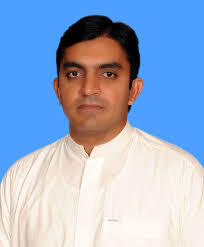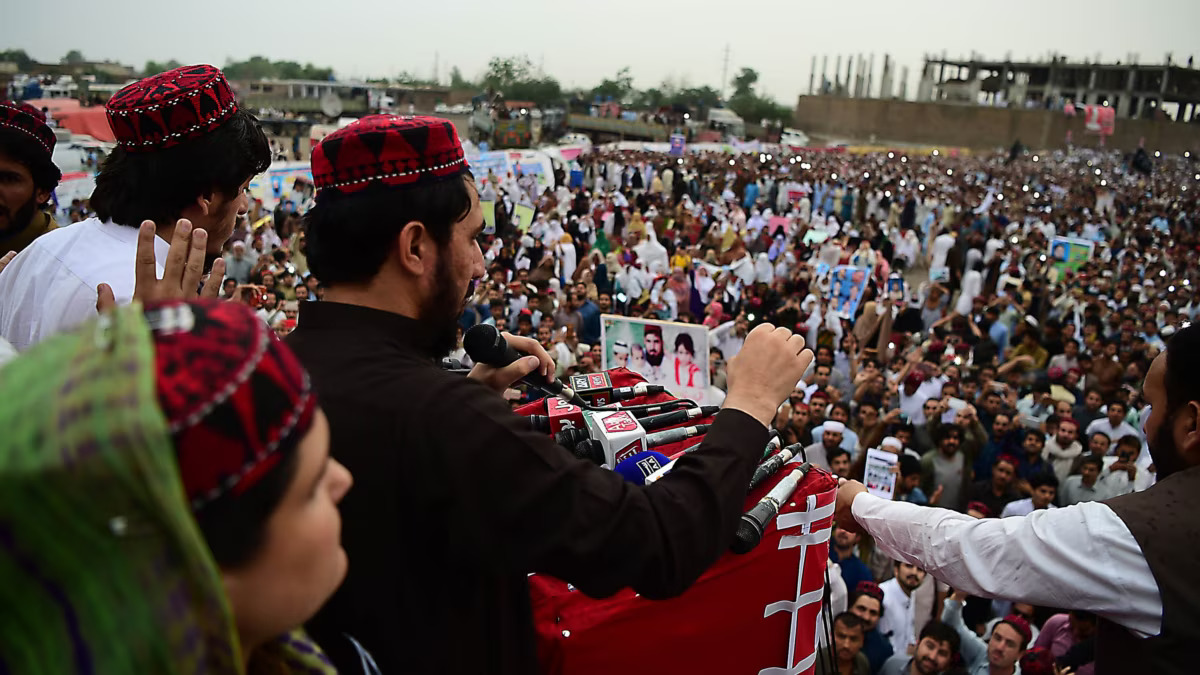The government of Pakistan’s decision to ban the Pashtun Tahaffuz Movement (PTM), a social movement that originated from the country’s peripheries, sends a troubling message to citizens—that their constitutional rights do not matter and that maintaining a non-violent stance will lead to harsh treatment. Since its inception, PTM has remained committed to peaceful protests. The non-violent nature of the struggle has been the movement’s greatest strength, and this peaceful approach is what appears to have provoked the state. The PTM has always been peaceful in its struggle, contrasting sharply with the actions of some mainstream political parties, such as the Pakistan Tehreek-e-Insaf (PTI) and the extremist group Tehreek-e-Labbaik Pakistan (TLP), which have resorted to violence in recent protests in several cities. Despite the unrest caused by these groups, they have been allowed to operate.
The way the state recently attempted to violently prevent the Grand National Jirga (dialogue) of Pashtuns organized by the PTM further reveals its intolerance for peaceful protests. The PTM called for a grand dialogue to discuss the situation of Pashtuns in Pakistan, the ongoing proxy wars in the region and their impact on Pashtuns, the militarization of Khyber Pakhtunkhwa, and the way forward. Pashtun political parties, academics, activists, and Pashtuns from various backgrounds were invited to the jirga. District Khyber was selected as the venue for the gathering. However, the state began disrupting preparations by initiating a crackdown against the PTM. In response to this call for the jirga, the federal government announced a ban on the PTM and declared it a proscribed organization. On October 9, the Khyber Pakhtunkhwa police and Frontier Corps launched an attack on the campsite of the jirga, opening fire on PTM activists present at the venue. Four PTM activists were killed, and many others were injured. Mobile networks in the area were shut down. This is how the state, including both the federal and provincial governments, chose to respond to the PTM’s call for a gathering of Pashtuns for peace.
About a month ago, the Supreme Court of Pakistan was compelled to reverse a ruling in favor of the rights of a religious minority group due to violent protests and threats from TLP aimed at the Chief Justice. This difference in the state’s response to protests by social movements and extremist groups highlights a concerning reality: violent groups are taken seriously, while peaceful advocacy is met with repression.
The origin of PTM
The PTM was founded primarily as a response to the state’s oppression in the Pashtun regions of Pakistan. Over the decades, the state used the region of ex-FATA (tribal districts that were merged with Khyber Pakhtunkhwa in 2018) as a launching pad for Project Taliban, a state agenda aimed at protecting Western interests. Under this project, the people of the Khyber Pakhtunkhwa province endured significant injustices and had no channels through which to voice their grievances, leading to a constant rise in oppression.
It was the state that initially settled militants in that region, which resulted in widespread violence, including suicide bombings. After several years of TTP’s terror, a military operation against the Taliban was launched that displaced locals. They were reassured that normalcy would return when they are back home after the military operations. However, upon returning, they found their homes demolished. Instead of leading honorable lives after the military action, they faced further humiliation. Security forces regularly raided their homes without explanation, and they endured mistreatment at check posts—all justified under the guise of anti-militancy operations.
After the military operation, it became evident that terrorists had not been the primary targets; rather, it was the homes of ordinary citizens that were destroyed. The state displaced Pashtuns in the name of peace and subjected them to further humiliation. In this context, Pashtun youth rallied against the state. The PTM was founded in 2018 following the brutal killing of a Pashtun youth, Naqeebullah Mehsud, in a fake police encounter. The movement gained momentum very rapidly in a very short period of time.
PTM emerged as a response to decades of oppression faced by the Pashtun people. It laid the foundation for a new political narrative that challenged the establishment’s policies, advocating for justice and rights for the Pashtun community. And the movement began facing intimidation right after its formation.
The government of Pakistan’s decision to ban the PTM, a social movement that originated from the country’s peripheries, sends a troubling message to citizens—that their constitutional rights do not matter.
The state’s double standards
The state of Pakistan engaged in negotiations with the Taliban during a period marked by brutal acts, including beheadings and suicide bombings across the country. As a result of the violence, the government felt compelled to negotiate with the Tehreek-e-Taliban Pakistan (TTP), and their initial plan was to concede certain areas to the militant group. However, these intentions were disrupted by our protests. The state’s current accommodation of the Taliban in Khyber Pakhtunkhwa suggests that this policy of giving space to the militants is being repeated.
This pattern of double standards was also apparent during the protests against election rigging earlier this year. While the PTI was allowed to protest and control the narrative surrounding alleged electoral mismanagement, our party, the National Democratic Movement, faced violence when we protested against rigging in Waziristan. I was shot and injured, and four of my colleagues lost their lives two days after the election—all because we sought accountability regarding the announcement of results in our constituency. The recent killing of four PTM activists during the state’s attempts to prevent the grand jirga serves as a reminder that this policy of using force against peaceful Pashtun protestors continues.
This disparity in the treatment of dissenting voices in Punjab compared to Khyber Pakhtunkhwa is alarming. The state has always overlooked the unrest perpetuated by religious extremist groups, such as the TLP and TTP. In contrast, peaceful social movements emerging from peripheral regions face disproportionate targeting and repression. This unjust treatment of individuals from smaller provinces has been a key feature in Pakistan’s relationship with these regions.
PML-N and PPP’s refusal to learn from the past
I urge the parties leading the federal government to learn from their past mistakes. During my time in the last National Assembly, I consistently warned PTI lawmakers not to facilitate legislation that granted unchecked power to the military establishment, as it could ultimately be used against them. I warned them that surrendering civilian authority to the establishment might make their own party vulnerable in the future, and that’s exactly what happened.
Given PTI’s current situation, both the Pakistan People’s Party (PPP) and the Pakistan Muslim League-Nawaz (PML-N) should have learned a lesson. They have encountered similar challenges in the past, yet they seem unwilling to acknowledge this lesson. Their refusal to learn from history will cost them dearly.

The writer is a former Pakistani parliamentarian and chair of the National Democratic Movement.

